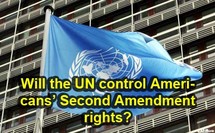I’m not a big fan of the United Nations and I’m not a supporter of gun control, so you can imagine how agitated I get when two bad things are combined together.
And that’s exactly what’s happening with a new anti-gun treaty being concocted by the United Nations.
John Bolton, a former U.S. Ambassador to the organization, explains what the other side is trying to achieve.
Gun-control advocates and the Obama administration are rushing to complete negotiations in New York on a proposed international agreement called the United Nations Arms Trade Treaty. They hope to finish the drafting within weeks, perhaps having a document ready for signature so that President Obama could press a lame-duck Senate to ratify it after our Nov. 6 elections.
He also explains why.
Gun-control groups, frustrated by years of failing to impose harsh measures on American firearms owners, have pursued a covert strategy. Instead of constant defeats in Congress and local legislatures, they instead shifted their attention to the international realm, hoping to achieve by indirection what they had consistently failed to do at home.
Simply stated, this is an effort to erode American sovereignty and short-circuit freedoms guaranteed by the Constitution.
Ambassador Bolton elaborates.
Ostensibly, UNATT is about regulating government-to-government arms transfers or direct sales by manufacturers to foreign governments. But the hidden agenda of the gun controllers is to craft treaty language that, while seemingly innocuous, has long-range implications for the use and ownership of guns here in America. The real danger lies in vague, ambiguous stipulations gun-control advocates could later cite as requiring further domestic restraints. In other words, they hope to use restrictions on international gun sales to control gun sales at home. Indeed, the theme underlying the negotiations is that the private ownership of guns is inherently dangerous. There is, of course, little doubt why dictatorships and authoritarian regimes don’t want their oppressed citizens to have weapons — but such positions do not merit American support.
And he provides some background, just in case anyone has any doubts about the true intentions of the treaty advocates.
The U.S. has a long history of respecting the individual ownership of firearms. It is against this legitimate tradition of private ownership that gun-control advocates are exerting their efforts. Their strategy surfaced most clearly in 2001 at a UN conference aiming to restrict international sales of “small arms and light weapons,” a precursor to the current negotiations. I was part of the Bush administration’s diplomacy to block this effort, which we ultimately succeeded in doing. During the 2001 debate, I spoke at the UN General Assembly in New York, and the reaction to my remarks revealed the gun-controllers’ hidden agenda. I said merely that the United States would not agree to any proposed treaty that would violate our Second Amendment freedoms. From the gun-control lobby’s reaction, you would have thought I said something outrageous or even dangerous. In truth, they knew we had uncovered their agenda and spiked it.
Fortunately, there’s no risk (at least at this moment) of the treaty getting approved by the U.S. Senate.
Significantly, a bipartisan letter signed by 58 senators has already rejected any treaty that seeks, however cleverly, to impose gun-control obligations on the U.S. The gun-control crowd’s strategy of trying to do through treaties what it cannot accomplish in America’s domestic political process is not unique to that issue. We have seen and will undoubtedly see many more examples of frustrated statists, unable to prevail in free and open debate, seeking to take their issues global, hoping to find more sympathetic audiences. Stopping UNATT will be one clear way to send a message that such strategies are doomed to failure.
But once the treaty begins to circulate around the world, and gets approval from the various dictatorships, kleptocracies, and thug regimes (as well as support from the milquetoast nations of Europe), then there will be pressure on the United States to join with “world opinion” and ratify the agreement.
 In other words, it will be like the Law of the Sea Treaty. Another misguided scheme that sits on the shelf, while statists wait for an opportune moment to impose it on the nation.
In other words, it will be like the Law of the Sea Treaty. Another misguided scheme that sits on the shelf, while statists wait for an opportune moment to impose it on the nation.
For more information on the folly of gun control, you can watch some good videos here, here, and here. I also recommend this Thomas Sowell column, this Cato Institute study, this Stephen Hunter column in the Washington Post, and my NRA-TV appearance on the importance of gun ownership as a safeguard against societal breakdown.
